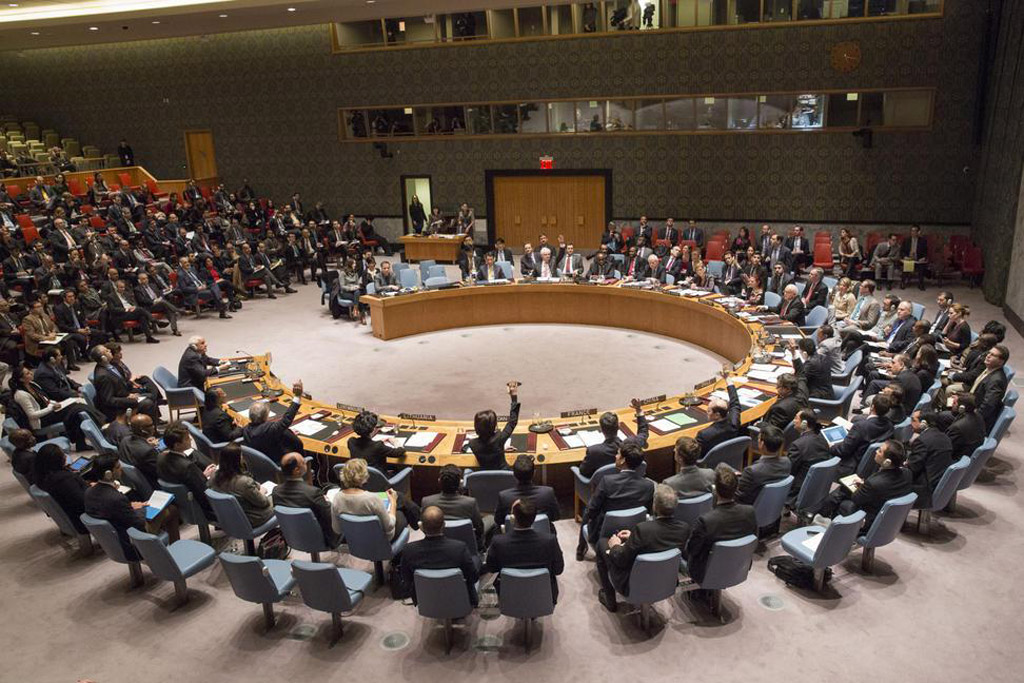On Tuesday, the UN Security Council failed to pass a resolution on Palestinian statehood. Wednesday the Palestinian Authority moved to join the International Criminal Court. Thus begins a chain of events that is unlikely to lead to a positive outcome anytime soon, but which is perhaps the only option remaining for those who desire to see a full fledged and independent Palestinian state.
The draft resolution, introduced by Jordan, would have set a twelve month timeline for:
“a just, lasting and comprehensive peaceful solution that brings an end to the Israeli occupation since 1967 and fulfills the vision of two independent democratic and prosperous states, Israel and a sovereign, continuous and viable state of Palestine living side by side in peace and security with mutually and internationally recognized borders.”
The actual terms of this agreement, had the resolution passed, would have been based on final status negotiations along the lines of previous attempts by the parties to reach a mutually agreed peace agreement—all of which since 1967, it can now be said with relative certainty as we enter 2015, have failed.
Other than the timeframe, after which the resolution explicitly states the Security Council “looks forward to welcoming Palestine as a full Member State of the United Nations,” the resolution itself contains little that hasn’t already been agreed upon in previous UN Security Council resolutions.
What is more noteworthy is the urgency with which the Palestinian Authority moved to put the resolution in blue, ensuring that a vote would take place before the end of the year despite the prospect of a friendlier Security Council when Malaysia and Venezuela take their seats in January (replacing South Korea and Rwanda which abstained) and the near certainty that the United States would use its veto.
This prompted speculation that the vote was a publicity stunt by the Palestinian Authority, seeking to have the resolution voted down without requiring a U.S. veto, an action which could lead the United States to cut off funding for and potentially bring sanctions against the Palestinian Authority. This could enable the Palestinians to move forward with its push for international recognition—and pursue a path of accession to the ICC and other international conventions and organizations with less impact to Palestinian relations with the U.S. government.
It could also strengthen Palestinian Authority leader Mahmoud Abbas, whose support has waned in recent years among a deeply divided Palestinian populace, while simultaneously weakening Hamas, which (along with Israel) could be subject to international law and war crimes prosecutions should the Palestinians—now a ‘non-state party observer’—be fully accepted as a state party the ICC.
Hamas on Saturday called the resolution “disastrous” because of its acceptance of the 1967 lines as the basis for negotiations on borders. Haaretz reports that the Palestinians expected the resolution to have the votes to pass but were surprised by a last minute abstention by Nigeria. Had Nigeria voted in favor, making the U.S. veto the difference, it would have provided a significant show of international support for a Palestinian state.
The vote also returned longstanding international cleavages on the issue of Palestine to the fore following a string of symbolic resolutions of recognition of Palestine by European parliaments and the EU in recent months. France voted in favor of the UN resolution along with other Permanent members China and Russia; Australia was the only other nation to vote with the U.S. against the resolution. Britain abstained. Speaking after the vote, US Permanent Representative to the UN Samantha Power called the resolution “deeply imbalanced,” saying it “staged confrontation” by establishing “unconstructive deadlines.”
The Israeli response to the vote was one of appreciation to the U.S. and Australia following weeks of strong statements against the draft resolution by members of the Israeli government. But the PA’s aggressive move to join international organizations, treaties and conventions is a move into uncharted territory in the 66-year-old conflict.
In recent weeks the U.S. State Department had been seeking to delay any action by the PA until after Israeli elections in March 2015. Prime Minister Netanyahu has faced widespread criticism in recent months, and it would have been all but impossible for any further constructive negotiations to take place until a new Israeli government is formed, regardless of a Security Council–enforced timeline.
By acting unilaterally now to seek international recognition first, and iron out the details second, Mahmoud Abbas and the Palestinian Authority acknowledge what has been clear to many for a very long time: Negotiations have failed. Resistance has failed. The waiting game of ‘managing the occupation’ has gone on for far too long. It’s time for something new.

